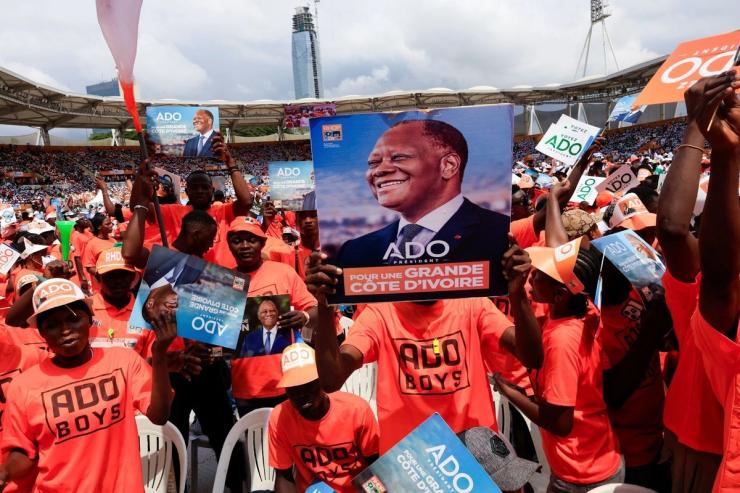The News
Ivorians are preparing to vote in presidential elections on Saturday amid rising tensions over the exclusion of opposition candidates and a government crackdown on dissent that has led to the arrest of more than 200 protesters this month.
President Alassane Ouattara, 83, is the favorite to win a fourth term, but will have to fend off challenges from four other candidates including Simone Ggbagbo, the ex-wife of former President Laurent Ggbagbo, who was barred from running in the polls. The vote comes months after leading opposition figure Tidjane Thiam, the former CEO of Credit Suisse, was disqualified over his dual citizenship with France.
Côte d’Ivoire, Francophone West Africa’s biggest economy and the world’s top cocoa producer, saw economic growth of 6% in 2024, outperforming the global average of 2.8%. It is one of the world’s fastest-growing economies, according to the IMF, and is projected to grow more than 6% this year and next.
But analysts say the absence of developed infrastructure in much of the country outside the capital city Abidjan and broad underemployment mean the benefits of economic growth have not been felt by Ivorians. Nearly four in 10 Ivorians still live below the poverty line.
Step Back
Ouattara, first elected in 2010, oversaw a constitutional change during his second term that allowed him to run for a third time in 2020. He has defended his decision to contest again by arguing that the amendment reset the clock on his leadership and that he is trying to “preserve national stability amid ongoing security and economic challenges.”
Ouattara rose to the top of Ivorian politics after high-ranking international development roles at the International Monetary Fund and the Central Bank of West African States, and following his role as prime minister to Côte d’Ivoire’s founding President Félix Houphouët-Boigny between 1990 and 1993.
Past Ivorian elections have been wracked with tensions too: At least 3,000 people were estimated to have died in the violence that followed the 2010 elections. Opposition-led protests have been frequent this year and the government last week sentenced more than two dozen protesters to prison and announced a two-month ban on further demonstrations.
Bordered to the north by a trio of junta-led states — Guinea, Mali and Burkina Faso — Côte d’Ivoire has also been hit by disinformation campaigns in the run up to the elections. In May, the government corrected unfounded rumors of a coup, explaining the claims as “the result of a deliberate and coordinated disinformation campaign” in a region where several reports have documented extensive Russian propaganda efforts.
Know More
Ouattara won the last election with 94% of the vote, according to the official count, with just above half of the registered voters participating. About 8.7 million people — or 27% of the population — are registered to vote this year.
His most prominent challenger this year, former First Lady Simone Gbagbo, has said she is in the race to win, but a consensus has formed among analysts that the vote is all but assured for Ouattara.
“Ouattara will face off against a clutch of candidates who are well known as individuals but lack the money and mobilizing capacity of a major political machine,” wrote Paul Melly, Chatham House’s expert on Francophone West Africa, predicting a first-round victory for Ouattara.
Notable
- Barred opposition candidate Tidjane Thiam talked to Bloomberg Weekend about his exclusion from the election and why African countries need democracy.


